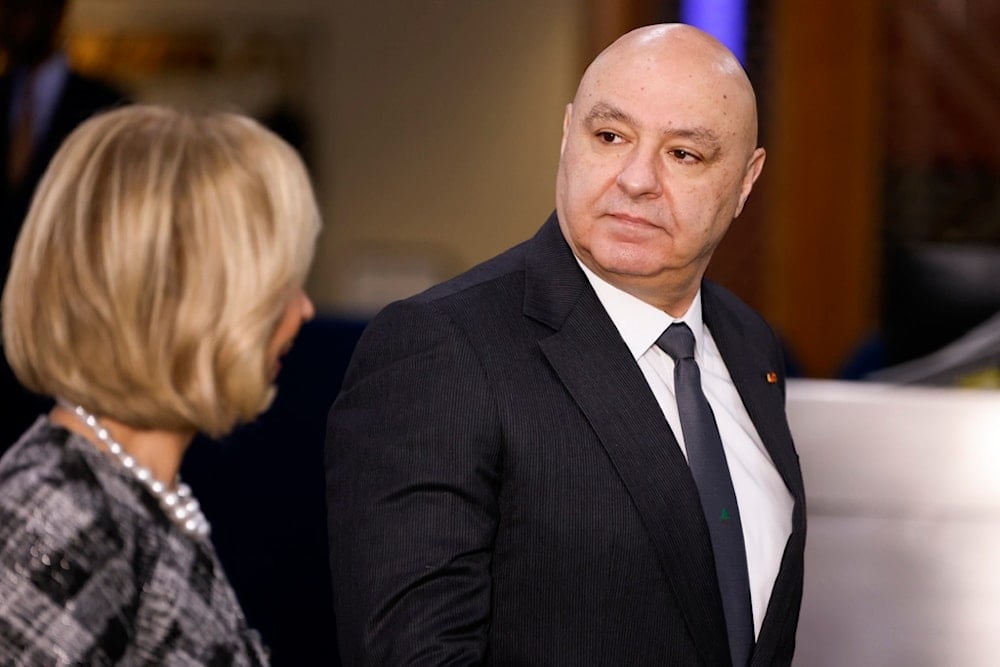Lebanon’s Aoun calls for talks with 'Israel' amid Gaza plan
Lebanese President Joseph Aoun urges negotiations with the Israeli regime, citing past maritime talks and Trump’s Gaza peace plan as war diplomacy shifts.
-

Lebanon President Joseph Aoun arrives for the 80th session of the United Nations General Assembly, Tuesday, September 23, 2025, at UN headquarters (AP)
Lebanese President Joseph Aoun stated Monday that “there is no alternative to negotiations” with the Israeli regime to resolve outstanding disputes, as US President Donald Trump’s plan for a ceasefire in Gaza begins implementation.
Speaking before a delegation from the Economic Media Association, Aoun recalled that Lebanon had previously held indirect talks with “Israel” under US and UN sponsorship, which led to the maritime border demarcation agreement.
“What prevents us from repeating the same process to solve other issues?” he asked, “especially since the war has achieved no results? Israel ended up negotiating with Hamas after exhausting its military options.”
Aoun emphasized that “the prevailing atmosphere today is one of settlements, and negotiations are inevitable,” noting that the framework and nature of such talks “will be determined at the appropriate time.”
The Lebanese president further condemned the ongoing Israeli strikes on Lebanese territory, which “the occupation claims target Hezbollah military positions but continue to kill civilians,” despite the US-brokered ceasefire that took effect in November 2024.
Israeli expanding violations: from Gaza to Qatar, a pattern of impunity
The Lebanese President's comments came at a time when the Israeli regime's record across West Asia reflects a persistent pattern of violations of sovereignty and international law.
From attacks in Syria and Lebanon to reported operations in Iran and, most recently, Qatar, Israeli actions have repeatedly drawn international condemnation. Acts include breaches of the UN Charter, extrajudicial assassinations, and large-scale military attacks in Gaza that human rights organizations have described as war crimes or acts of genocide.
A United Nations Commission of Inquiry, in a report released in September 2025, concluded that Israel committed genocide in Gaza, finding evidence of killing, causing serious harm, imposing life‐conditions calculated to destroy parts of the population, and measures to prevent births, among other acts.
UN experts have also accused Israeli forces of using sexual violence, targeting maternity wards and women’s health infrastructure, and destroying such facilities, actions that may be categorized as war crimes or crimes against humanity under international law.
Despite these crimes, the Israeli regime continues to operate with impunity, challenging the international bodies' ability to uphold accountability and enforce global legal norms.
Aggression targets southern Lebanon
Al Mayadeen's correspondent in southern Lebanon reported early Saturday morning that one individual was martyred and seven others sustained injuries as a result of the latest wave of Israeli attacks targeting the area between Musaylih and al-Najariya. The Israeli raids specifically targeted excavation equipment and bulldozers operating in the area. The bombardment led to disruption on the road linking the cities of Saida and Nabatieh.
On a related note, the United Nations Interim Force in Lebanon (UNIFIL) condemned a second grenade attack by the Israeli occupation on its peacekeepers this month, calling it a serious violation of international agreements and a direct threat to UN personnel operating under a Security Council mandate.
In an official statement, UNIFIL reported that just before noon on Saturday, an Israeli drone dropped a grenade that exploded near a UN position in Kfar Kila, a town along the Lebanese-Palestinian border. One peacekeeper sustained light injuries and was provided with immediate medical assistance.
The Israeli ceasefire with Lebanon officially took effect on November 27, 2024, at 4:00 am (local time). However, the Israeli occupation continued its aggression against Lebanon and did not commit to the agreement. Till today, Israeli occupation forces continue to occupy seven strategic areas in southern Lebanon and continue to carry out attacks on southern and northern Lebanon.

 4 Min Read
4 Min Read









